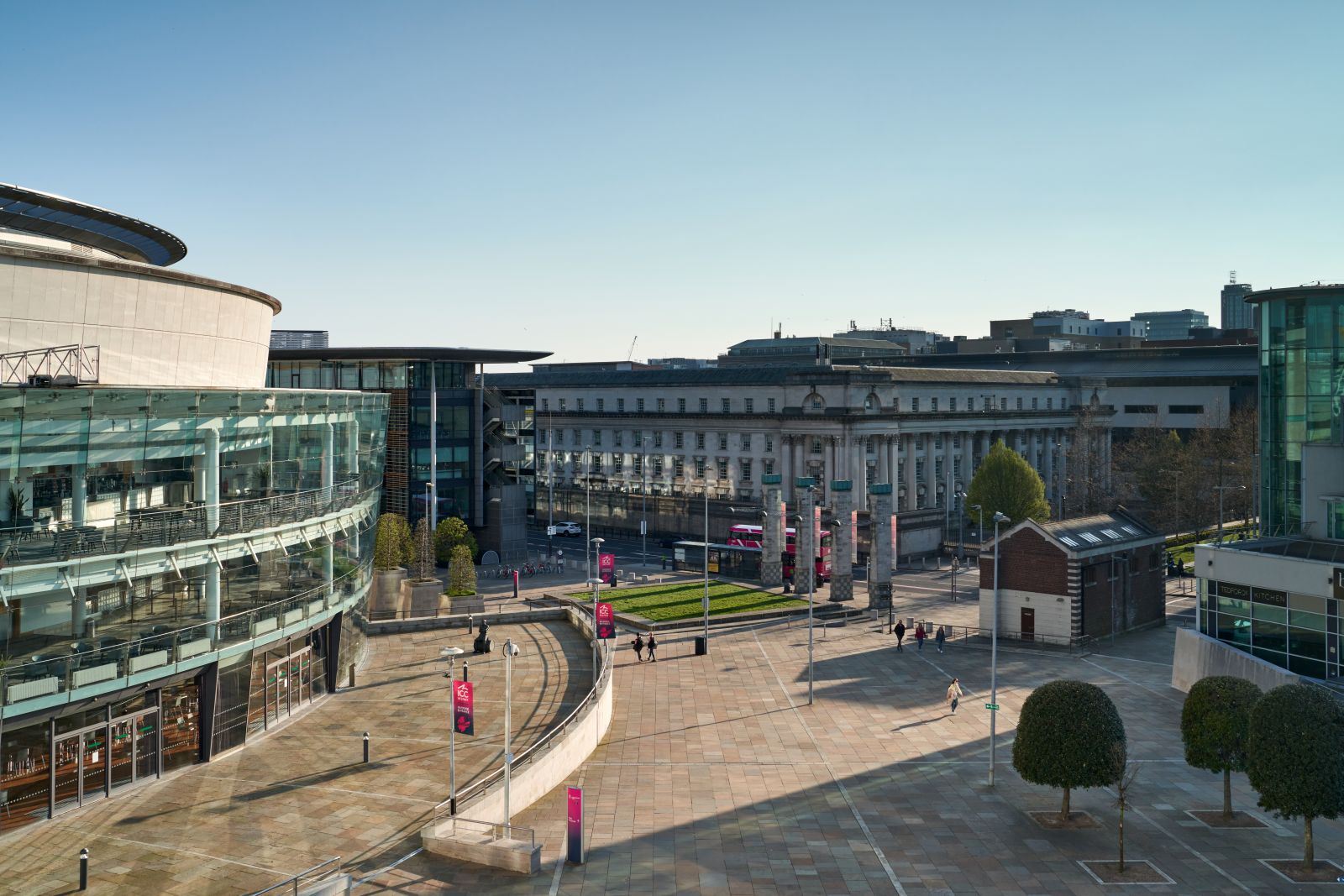Belfast: Meetings that Change Lives!

The need to meet, network and collaborate in Belfast did not disappear during the pandemic – rather it became greater than ever. Visit Belfast will continue to channel live events leading on its industry strengths, and converting business opportunities in a sector that will have to justify the carbon and financial costs of events.
.png) On our last visit to the Northern Ireland capital in 2019, we referred to Belfast as “a rising star in the MICE industry, quietly moving towards the top of Europe’s meeting destinations.” Three years on, Visit Belfast, its industry partners and clients, have successfully navigated a complex environment affected by late registrations and uncertain delegate numbers, flight disruptions, supplier crisis, rising hospitality costs as well as staff shortages across the industry. “We used that challenging period to up our game on tech & hybrid, accelerate our work on sustainability, and set up pioneering sector advisory panels so that we align our business events strategy with the economic development, research and education goals of Belfast and Northern Ireland,” says Rachael McGuickin (pictured on the right), Director of Business Development, Sustainability and Transformation at Visit Belfast. Despite these challenges, Northern Ireland has launched two new financial support schemes for conference organisers to help clients return “live” and have secured £20.1m of new business in Belfast in 21-22, a 34% increase on the previous year.
On our last visit to the Northern Ireland capital in 2019, we referred to Belfast as “a rising star in the MICE industry, quietly moving towards the top of Europe’s meeting destinations.” Three years on, Visit Belfast, its industry partners and clients, have successfully navigated a complex environment affected by late registrations and uncertain delegate numbers, flight disruptions, supplier crisis, rising hospitality costs as well as staff shortages across the industry. “We used that challenging period to up our game on tech & hybrid, accelerate our work on sustainability, and set up pioneering sector advisory panels so that we align our business events strategy with the economic development, research and education goals of Belfast and Northern Ireland,” says Rachael McGuickin (pictured on the right), Director of Business Development, Sustainability and Transformation at Visit Belfast. Despite these challenges, Northern Ireland has launched two new financial support schemes for conference organisers to help clients return “live” and have secured £20.1m of new business in Belfast in 21-22, a 34% increase on the previous year.
Belfast has been recognised as one of the top sustainable destinations for tourism and events ranking 8th in the World, as the wider local industry has joined the Green Tourism and Green Meetings initiative, launched by Visit Belfast and Belfast City Council. “By 2023, sustainability and impact will underpin everything we do to increase the social and legacy benefits of events, while reducing carbon impact and taking a much more regenerative and circular approach,” says McGuickin. To do this, they rely on strategic partnerships with local and central governments, economic development agency (Invest NI), world-class universities and a network of 1,200 business, medical and academic leaders to develop legacy and impactful plans with their clients.
 Despite historically difficult geopolitical conditions, economic development and tourism in the region has flourished over the past two decades. “We will be focused on ambitious but sustainable growth, securing £42m of new business events for the city.” From a tourism perspective, this will deliver key mid-week, high value visitors identified in the event bid strategy prioritising the vision of Northern Ireland’s Department for Economy in Life Sciences and Health, Cyber Security, Financial Services and Fintech, Advanced Manufacturing and Agri-Food sectors. “Through a pilot approach undertaken in 2022, we have also started to identify some common sustainable outcomes that Visit Belfast can measure and influence for events, such as funds and in-kind donations, local projects and social initiatives, health activities, carbon impacted, etc.,” says McGuickin. Northern Ireland has long been feted as a resilient destination − the hosting of the One Young World Summit in Belfast in 2023, in line with the 25th anniversary of the Good Friday Agreement, adds credibility to this. “While it is difficult to predict the long-term impact of changing conditions on the macro environment, we recognise the need for greater flexibility from event organisers and collaboration with all our clients. The health and safety of all visitors remains our priority, so a range of measures remain in place at ICC Belfast to prevent the spread of COVID- 19,” says Julia Corkey (pictured on left), Chief Executive at ICC Belfast.
Despite historically difficult geopolitical conditions, economic development and tourism in the region has flourished over the past two decades. “We will be focused on ambitious but sustainable growth, securing £42m of new business events for the city.” From a tourism perspective, this will deliver key mid-week, high value visitors identified in the event bid strategy prioritising the vision of Northern Ireland’s Department for Economy in Life Sciences and Health, Cyber Security, Financial Services and Fintech, Advanced Manufacturing and Agri-Food sectors. “Through a pilot approach undertaken in 2022, we have also started to identify some common sustainable outcomes that Visit Belfast can measure and influence for events, such as funds and in-kind donations, local projects and social initiatives, health activities, carbon impacted, etc.,” says McGuickin. Northern Ireland has long been feted as a resilient destination − the hosting of the One Young World Summit in Belfast in 2023, in line with the 25th anniversary of the Good Friday Agreement, adds credibility to this. “While it is difficult to predict the long-term impact of changing conditions on the macro environment, we recognise the need for greater flexibility from event organisers and collaboration with all our clients. The health and safety of all visitors remains our priority, so a range of measures remain in place at ICC Belfast to prevent the spread of COVID- 19,” says Julia Corkey (pictured on left), Chief Executive at ICC Belfast.
As with any commercial business, ICC Belfast was not immune to the effects of the pandemic and became a COVID-safe nightingale site for nine months of 2021. However, the swift action taken at the start of the pandemic safeguarded the economic impact for the future, says our respondent: “Multi-disciplinary teams were assembled to address client concerns with tailor- made “Survival Kits”. As a result, over 95% of booked business was retained and leveraged to secure multi-year deals with mutually beneficial commercial outcomes.” One of Northern Ireland’s unique propositions is how stakeholders can work together from venues to DMOs. This was no different during the pandemic when ICC Belfast, Visit Belfast and others secured £0.7M as part of the MICE Task and Finish Group, working under the direction of the Department for the Economy as part of the wider Tourism Recovery Group. This funding ensured that the momentum built before the pandemic was not lost and the destination remained front of mind for target audiences. There is also an open support scheme for not-for-profit organisations that can be used for events taking place between 2023- 2030. “Our Sustainability and Impact Manager also offers practical advice in the form of a sustainability framework and toolkit to maximise the impact and legacy of your event,” says McGuickin. In response to the pandemic, ICC Belfast went hybrid by design and won several awards as an industry disruptor including the 'Event Technology Awards'“most innovative and tech-friendly venue”. By championing digital transformation and a data-driven approach, ICC Belfast has laid solid foundations to remain at the forefront of the MICE industry. “Over the past year, our team has trialled new methods to improve the performance of our members and our customers’ experience, adopting digital tools and processes wherever possible to cut repetitive tasks, reduce duplication and introduce automation.” Over 100 broadcast conferences, product launches and ceremonies have taken place since the venue emerged from the extended closure period.

Improving the sustainability credentials of Belfast’s tourism and hospitality industry has been key to the city’s success, helping it climb into the GDS-Index world top ten in just two years. In June 2021, Visit Belfast and Belfast City Council launched the world’s largest green tourism city partnership − around 70% of the city’s hotel stock is now sustainability certified and this will increase to 90% by 2024. “As well as working with industry partners, we have been driving best practice through local initiatives, such as cutting waste and reusing materials, which are leading to greater circularity in the industry,” says McGuickin. In 2020, Belfast launched the 10-year resilience strategy which set out 30 transformation programmes of which “Sustainable Tourism and Events” is one of them. As a result, Visit Belfast has embedded sustainability into all areas of the business focusing on three pillars − environmental, social and economic. “In the final breath of our 3-year plan we will be developing a number of projects such as carbon measurement of Visit Belfast activities, and we are also helping our visitors to reduce their carbon impact,” says McGuickin. In late 2022, Visit Belfast officially launched its social impact flagship project “Changing The Menu. For Good”, which aims to tackle food poverty in Belfast. The project will enlist local venues, caterers and event organisers to raise funds directly for local food banks, and comes at a critical time following the cost of living crisis.
"We believe in the power of events and the positive impact they can have."
“We believe in the power of events and the positive impact they can have. Our mission is that by 2024, every conference coming to Belfast will have a legacy and an impact plan,” says McGuickin. In 2023, they will launch a generic impact & legacy programme for all business events that will initially focus on themes such as Social Impact, Circular Economy, Love Local, Innovation/ Education/Business, while also working with a range of strategic events on bespoke plans including One Young World 2023, UK Space 2023 and Cyber UK. Finally, the Ambassador Circle − an extensive network of academic, medical and business professionals to support the recovery from post-pandemic events − is already the largest sales channel, providing 79% of all business events for Belfast. “Visit Belfast will double down on its sectoral approach to build compelling propositions and the business case for each opportunity by harnessing the power of our government’s 10X strategy and taking a highly strategic approach to bids and sector research,” McGuickin concludes.
Other Articles
About Us
Supported by the Union of International Associations (UIA), the International Association of Professional Congress Organisers (IAPCO) and the Interel Group, the global public affairs and association management consultancy, Headquarters Magazines serve the needs of international associations organising worldwide congresses.














